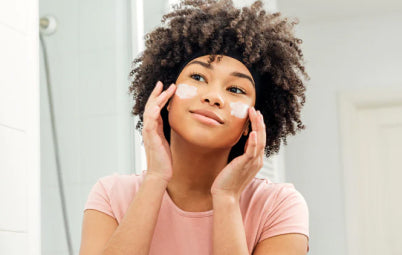Hyperpigmentation is a common skin condition where patches of the skin appear darker than the rest of your skin tone. It’s a natural and harmless reaction in the skin, but, if you don’t like the look of these dark spots, there are a few simple things you can do about them.
But first, what exactly is hyperpigmentation? We’ve rounded up its symptoms and causes so you can have a better idea of how and why it happens, as well as how to treat it.
Want to skip the research and get an expert opinion on your skin straight away? Here at Face Dr, we offer free online skincare consultations with our experts for you to do just that.

What causes hyperpigmentation?
Hyperpigmentation is caused by an excess of melanin, the natural pigment which gives skin, hair and eyes their colour. Dark spots and discolouration can be a few small dark spots or cover larger areas as brown patches. Most often, they’re found on the face but hyperpigmentation can also be seen on the arms and legs as well as on other areas of the body.
There are four main causes of hyperpigmentation:
- Sun exposure
- Hormonal changes
- Inflammation
- Side effects to medications, antibiotics or chemotherapy treatments
Sun exposure hyperpigmentation or sunspots
Sunspots, also called age spots or liver spots, are the most common type of hyperpigmentation and, as the name suggests, they’re caused by sun exposure.
When exposed to harmful UV rays in the sun, our skin produces melanin to absorb these rays and protect the skin from damage. This is what you see when you get a tan as the melanin is spread evenly throughout the skin making it look darker. But when it spreads unevenly, this extra melanin appears as dark patches or spots.
As it’s caused by sun exposure, sunspots are most often found on areas of the body that see the sun the most like the face and hands. And sun exposure can also make existing dark spots worse, even if they weren’t caused by the sun in the first place.

Hormonal changes or melasma
Melasma is a type of hyperpigmentation that experts think is caused by hormonal changes. These dark patches also appear most often on the face but can also be seen on the stomach and sometimes elsewhere on the body. They can look similar to sunspots but are more often seen as discoloured patches rather than small spots.
As it’s triggered by hormonal changes, melasma is often seen in pregnant women—it’s also called the “mask of pregnancy”—those on the contraceptive pill and those receiving hormone treatments. And it often goes away once your hormones even out, such as after pregnancy or once someone stops taking the birth control pill.
Want to find out more about melasma and the different hyperpigmentation types? We've covered them here.
Post-inflammatory hyperpigmentation
The third most common type of hyperpigmentation is post-inflammatory hyperpigmentation. And, as the name suggests, it appears after the skin has been inflamed. This inflammation can be due to an injury like a cut, burn or mark from surgery; from a skin condition like acne or eczema; or from an allergic reaction. The inflammation stimulates melanin production in the skin which causes extra pigment to be made and released. This leaves a discoloured patch behind once the skin has healed from the original wound or condition.
Side effect to medications, antibiotics or chemotherapy treatments
Some medications, antibiotics and chemotherapy treatments can cause hyperpigmentation as a side effect. Certain medications can make the skin more sensitive to sunlight, meaning melanin is produced more easily and quicker than usual, and others can simply trigger melanin producing cells to make more pigment which leads to dark spots and discolouration on the surface of the skin.
Is hyperpigmentation harmful?
Most of the time, hyperpigmentation isn’t anything to worry about. It’s simply a natural process and cosmetic change that many people don’t like the look of.
But, in rare cases, it could be a sign of an underlying condition. Vitamin deficiencies, Addison’s disease and hemochromatosis can also cause hyperpigmentation and discolouration of the skin. If you notice changes in your skin tone alongside other symptoms such as nausea, dizziness, fatigue or notice hyperpigmentation in areas like the inside of the mouth, lips and knuckles, it’s worth speaking with a skincare expert or a doctor to get checked out.

How to prevent hyperpigmentation
It’s always easier to prevent hyperpigmentation from happening in the first place than treating it once it’s already happened. But, this is easier said than done.
The easiest type of hyperpigmentation to prevent are sunspots by avoiding excessive sun exposure and tanning beds. Not only is this the easiest type to prevent, but this also helps to reduce the chances of other types of hyperpigmentation, too, all of which are made worse by the sun.
Be sure to wear sunscreen with an SPF of at least 30 and one which is broad spectrum to protect against UVA and UVB rays. And don’t forget, sunscreen should be worn even on overcast days and reapplied often if you’re out in the sun for prolonged periods of time, especially if you’re sweating or swimming. Wear a hat or long-sleeves and, if possible, avoid sun exposure in the middle of the day when UV rays are at their strongest.
Melasma and post-inflammatory hyperpigmentation are harder to prevent. But, if you know you’re prone to hyperpigmentation, you can attempt to avoid melasma by considering a non-hormonal contraceptive method and reduce your chances of developing post-inflammatory dark spots by avoiding picking or touching wounds, cuts or acne spots.
How to treat hyperpigmentation
There are a range of skincare products which can help to lighten the look of dark spots from home. These include brightening creams and serums, spot treatments, exfoliators and chemical peels of varying strengths, including over the counter and prescription options. You can find out more about the ideal skincare routine to tackle hyperpigmentation here.
For stubborn dark spots and large patches, you may want to consider cosmetic procedures performed by skincare professionals. These range from stronger chemical peels to laser treatments which target deeper discolouration.
Want to fight hyperpigmentation?

Here at Face Dr, we offer free online skincare consultations. So, if you’re concerned about hyperpigmentation and would like to speak with an expert about it, book a free online consultation.
They can analyse your skin, ask about your concerns and then recommend the very best products to help. Whether you need one targeted treatment or a whole new routine, our experts are on hand to help.








